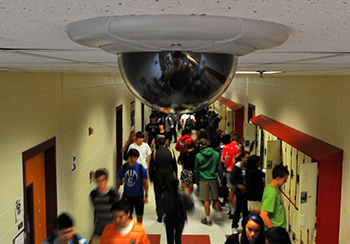Report Highlights School Safety Gains, Losses
 WASHINGTON — The Indicators of School Crime and Safety for 2013 was released in June, highlighting a number of safety and security issues at the nation’s schools. The report is the result of a long-standing collaboration between researchers from the American Institutes for Research, National Center for Education Statistics and Bureau of Justice Statistics, and is intended to serve as a reference for developing effective programs and policies aimed at violence and school crime prevention.
WASHINGTON — The Indicators of School Crime and Safety for 2013 was released in June, highlighting a number of safety and security issues at the nation’s schools. The report is the result of a long-standing collaboration between researchers from the American Institutes for Research, National Center for Education Statistics and Bureau of Justice Statistics, and is intended to serve as a reference for developing effective programs and policies aimed at violence and school crime prevention.
The report is the 16th of its kind to be issued, and provides the most recent national indicators on school crime and safety. Data was drawn from national surveys of students, teachers, principals and post secondary institutions, covering topics such as victimization, teacher injury, bullying, school conditions, fights, weapons, availability and use of drugs and alcohol, student perceptions of personal safety, and criminal incidents at postsecondary institutions.
Starting on a positive note, researchers reported that total victimization rates for students ages 12 to 18 declined both inside and outside of school between 1992 and 2012. In 2012, students were victims of about 1,364,900 nonfatal victimizations at school, including 615,600 thefts and 749,200 violent victimizations, 89,000 of which were serious violent victimizations. Seven percent of students in grades 9–12 also reported being threatened or injured with a weapon, such as a gun or knife.
Gender and geography appear to play a role in incidents of school violence, as male students tended to experience higher school victimization rates than their female counterparts throughout 2012. Urban and suburban students also experienced higher rates of violent victimization than those attending rural schools.
Teachers were also not immune from abusive and threatening behavior. Public teachers reported being threatened with injury or being physically attacked by a student more often than private school educators during the 2011-2012 school year. Elementary teachers were also slightly more likely to experience abuse or threats, with 10 percent reporting such incidents as opposed to 9 percent of secondary teachers.
Crime was experienced almost universally in schools during the 2009-2010 school year, as 85 percent of public schools recorded that one or more crime incidents had taken place, amounting to an estimated 1.9 million crimes. According to the study, this translates to a rate of 40 crimes per 1,000 public school students enrolled in 2009–10. During the same year, 60 percent of public schools reported a crime incident that occurred at school to the police, amounting to 689,000 crimes.
However, between 1993 and 2011, the percentage of students in grades 9–12 who reported carrying a weapon on school property declined, from 12 percent to 5 percent. Students carrying weapons were almost four times as likely to be male.
Declining crime in some areas could be attributed to the fact that 88 percent of public schools reported controlling access to school buildings through locking or monitoring in 2011-2012, and 64 percent reported using security cameras. During the previous year, 43 percent of public schools also reported the presence of one or more security staff at their school at least once a week during the school year, and 29 percent reported having at least one full-time employed security staff member present at least once a week. Twenty-eight percent of all schools reported the presence of security staff routinely carrying a firearm at school
Other security measures included a student code of conduct, required visitor sign in, staff supervision, security electronics, and metal detectors.
The entire report is available at: http://nces.ed.gov/programs/crimeindicators/ crimeindicators2013/
